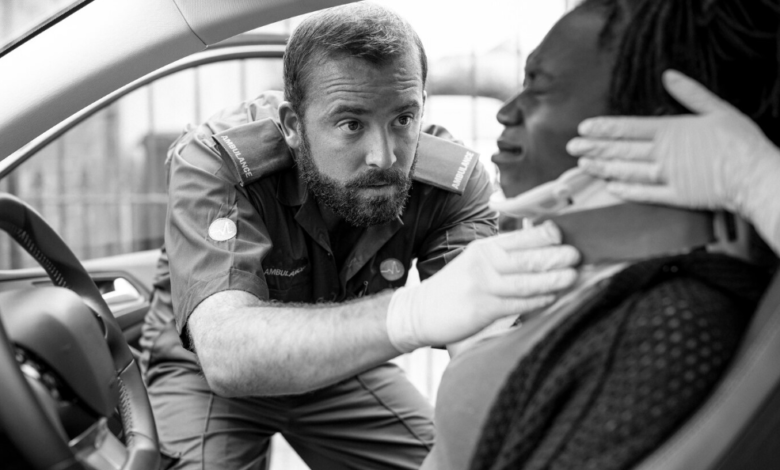Why Seeing a Pain Specialist After a Car Accident Can Prevent Long-Term Injury

Uncovering Hidden Injuries After a Car Accident
It’s easy to think you’re okay after a car accident, especially with adrenaline pumping. But some injuries don’t show up right away. That’s why seeing a pain specialist is so important – they can find problems you might not even know you have.
The Deceptive Nature of Whiplash
Whiplash is a classic example of a delayed injury. You might feel fine at the scene, but neck pain and stiffness can creep up hours or even days later. This happens because the force of the impact stretches and tears the ligaments and muscles in your neck. It’s not always obvious right away, but it can lead to long-term discomfort if not treated.
Identifying Soft Tissue Damage
Soft tissue injuries, like sprains and strains, are also common in car accidents. These injuries affect muscles, ligaments, and tendons. They might not show up on an X-ray, but they can cause significant pain and limit your movement. A pain specialist can use specific tests to identify these injuries and create a treatment plan to help you heal.
Recognizing Delayed Symptoms
Sometimes, the shock of an accident can mask pain. It’s not unusual for symptoms to appear days or even weeks later. These can include:
- Headaches
- Back pain
- Numbness or tingling
- Fatigue
It’s important to pay attention to your body after an accident, even if you feel okay initially. Keep a record of any new or worsening symptoms and share them with your doctor or a pain specialist. Early detection is key to preventing chronic pain and long-term complications.
Preventing Chronic Pain From a Car Accident
It’s easy to think you’re fine after a car accident, especially if the initial impact wasn’t severe. But pain can be sneaky. It might start as a little ache and then, before you know it, it’s a constant companion. Seeing a pain specialist early on can really change the game when it comes to preventing that short-term pain from turning into a long-term problem.
Early Intervention for Lasting Relief
Getting checked out quickly after a car accident is super important. It’s not just about feeling better now; it’s about stopping bigger problems down the road. A pain specialist can spot things that might get missed in a regular check-up, like subtle nerve damage or soft tissue injuries. The sooner you address these issues, the better your chances of a full recovery.
Stopping Acute Pain From Becoming Chronic
Acute pain is your body’s way of saying, “Hey, something’s wrong!” If you ignore it, it can morph into chronic pain, which is a whole different beast. Chronic pain can mess with your sleep, your mood, and your ability to do everyday things. Pain specialists have tools and treatments to manage acute pain effectively, so it doesn’t become a long-term issue. These treatments can include:
- Medication to ease the initial discomfort
- Physical therapy to help you regain strength and flexibility
- Injections to target specific pain areas
Minimizing Long-Term Disability Risks
No one wants to think about disability, but car accidents can sometimes lead to it. Chronic pain is a major contributor to long-term disability after a car accident. By getting early and effective pain management, you’re not just reducing your pain; you’re also lowering your risk of developing a disability that could impact your life for years to come.
Ignoring pain after a car accident can have serious consequences. It’s not just about the physical discomfort; it’s about your overall quality of life. Early intervention is key to preventing chronic pain and minimizing the risk of long-term disability.
The Specialized Role of a Pain Specialist After a Car Accident
After a car accident, you might think your regular doctor can handle everything. And they can help! But sometimes, the injuries are complex, or the pain just won’t go away. That’s where a pain specialist comes in. They have extra training and tools to deal with pain, especially the kind that sticks around after an accident.
Expert Diagnosis of Accident-Related Trauma
Pain specialists are like detectives for pain. They’re really good at figuring out exactly what’s causing your pain, even if it’s not obvious. They use special tests and their knowledge of the body to pinpoint the source of the problem. This is super important because you can’t treat pain effectively until you know what’s causing it. They can distinguish between different types of pain, like nerve pain versus muscle pain, which require different approaches.
Comprehensive Treatment Approaches
It’s not just about pills. Pain specialists have a whole toolbox of treatments they can use. This might include:
- Medications (but not just painkillers)
- Injections to block pain signals
- Physical therapy to strengthen muscles and improve movement
- Nerve blocks for nerve pain
They create a treatment plan that’s just for you, based on your specific injuries and how your body responds. They also keep an eye on how well the treatment is working and make changes as needed.
Beyond General Practitioner Care
Your family doctor is great for general health stuff, but pain specialists have a deeper understanding of pain management. They’re up-to-date on the latest research and techniques. Think of it this way:
| Feature | General Practitioner | Pain Specialist |
| Training | Broad medical care | Specialized pain focus |
| Treatment Options | Basic pain relief | Advanced interventions |
| Expertise | General health | Complex pain conditions |
They can also coordinate your care with other specialists, like physical therapists or surgeons, to make sure you’re getting the best possible treatment. If you’re dealing with persistent pain after a car accident, seeing a pain specialist can make a big difference in your recovery.
Protecting Your Legal and Financial Rights After a Car Accident
Car accidents are stressful, and dealing with the aftermath can feel overwhelming. It’s easy to focus solely on your physical recovery, but protecting your legal and financial rights is just as important. Don’t let the insurance companies take advantage of you.
Documenting Injuries for Insurance Claims
Detailed documentation is key to a successful insurance claim. Keep records of everything: medical reports, therapy sessions, prescriptions, and even over-the-counter pain relievers. Write down how your injuries affect your daily life – your ability to work, do chores, or enjoy hobbies. Photos of vehicle damage and visible injuries are also helpful. The more evidence you have, the stronger your claim will be.
Meeting Critical Deadlines for Coverage
Time is of the essence after a car accident. There are deadlines for reporting the accident, filing insurance claims, and potentially pursuing legal action. Missing these deadlines could jeopardize your ability to receive compensation for your injuries and damages. Contact your insurance company immediately and consult with a legal professional to understand the specific deadlines in your case. Don’t delay – protect your rights by acting promptly.
Building a Strong Personal Injury Case
If the accident was caused by someone else’s negligence, you may have grounds for a personal injury case. This can help you recover compensation for medical expenses, lost wages, pain and suffering, and other damages. A strong case requires solid evidence, including police reports, witness statements, medical records, and expert testimony. An attorney specializing in personal injury can help you gather this evidence and build a compelling case to protect your interests.
It’s important to remember that insurance companies are businesses, and their goal is to minimize payouts. They may try to downplay your injuries or offer a settlement that is far less than what you deserve. Don’t accept the first offer without consulting with an attorney. They can evaluate your case and advise you on the best course of action.
Addressing the Psychological Impact of a Car Accident
Car accidents do more than just dent metal and cause physical injuries. They can really mess with your head. It’s normal to feel shaken up, but sometimes those feelings stick around and become something more serious. Ignoring the mental side of things can slow down your overall recovery, so it’s important to pay attention to how you’re feeling.
Recognizing Post-Traumatic Stress
Post-traumatic stress disorder, or PTSD, is a real possibility after a car accident. It’s not just about being a little nervous; it can involve flashbacks, nightmares, and intense anxiety when you’re reminded of the accident. You might find yourself avoiding certain roads or even getting into a car at all. If these symptoms are interfering with your daily life, it’s time to get some help.
Coping With Anxiety and Depression
Anxiety and depression are also common after car accidents. The stress of dealing with injuries, insurance, and potential legal issues can take a toll. You might have trouble sleeping, lose your appetite, or just feel generally down. It’s easy to brush these feelings aside, but they can have a big impact on your recovery. Don’t hesitate to reach out to a mental health professional if you’re struggling.
Holistic Recovery Strategies
Recovering from a car accident isn’t just about fixing your body; it’s about healing your mind too. A holistic approach considers all aspects of your well-being. This might include:
- Therapy or counseling to process the trauma
- Mindfulness and meditation to reduce stress
- Support groups to connect with others who understand
- Exercise and healthy eating to boost your mood
Taking care of your mental health is just as important as taking care of your physical injuries. Don’t be afraid to seek help and prioritize your emotional well-being. It’s a sign of strength, not weakness.
Frequently Asked Questions
Why is it important to see a doctor right after a car accident, even if I feel okay?
It’s super important because some serious injuries, like whiplash or soft tissue damage, might not hurt right away. They can show up hours, days, or even weeks later. A doctor can find these hidden problems early, which helps you get better faster and stops small issues from becoming big, long-lasting ones. Also, seeing a doctor quickly creates important records for your insurance or any legal claims you might need to make.
What kind of doctor should I see first after a car crash?
Your family doctor is usually a good first stop. They can check you over and then send you to other experts if needed. For injuries common in car accidents, like neck or back pain, a chiropractor or physical therapist might be very helpful. If your pain doesn’t get better, a pain specialist is the best person to see; they focus on managing ongoing pain.
What exactly does a pain management doctor do for accident injuries?
A pain management doctor is an expert in figuring out what’s causing your pain and how to treat it. They’ll do a full check-up, and sometimes use special tests like X-rays or MRIs, to understand your injury. Then, they’ll create a plan to help ease your pain using treatments that don’t involve surgery, aiming to help you heal and feel better.
How is a pain specialist different from a regular doctor when it comes to car accident injuries?
While your regular doctor is great for general health, a pain specialist has special training just for injuries from accidents. They know how to spot the less obvious signs of damage that a general doctor might miss. This special knowledge helps them find your injuries faster and start the right treatments sooner, which can make a big difference in how well you recover.
How quickly do I need to see a doctor after a car accident?
You should see a doctor as soon as you can, ideally within 24 hours. Waiting too long can make your injuries worse and might even cause long-term pain. Plus, if you delay, your car insurance might not cover your medical bills. Seeing a doctor quickly protects both your health and your right to get help with costs.
Why is getting medical care important for my insurance claim or legal case?
Every doctor’s visit and treatment you get creates official records. These papers are super important because they prove that your injuries came from the car accident. This proof is key for getting your medical bills paid by insurance or if you need to take legal action. Without these records, it’s much harder to show how the accident affected your health and finances.




